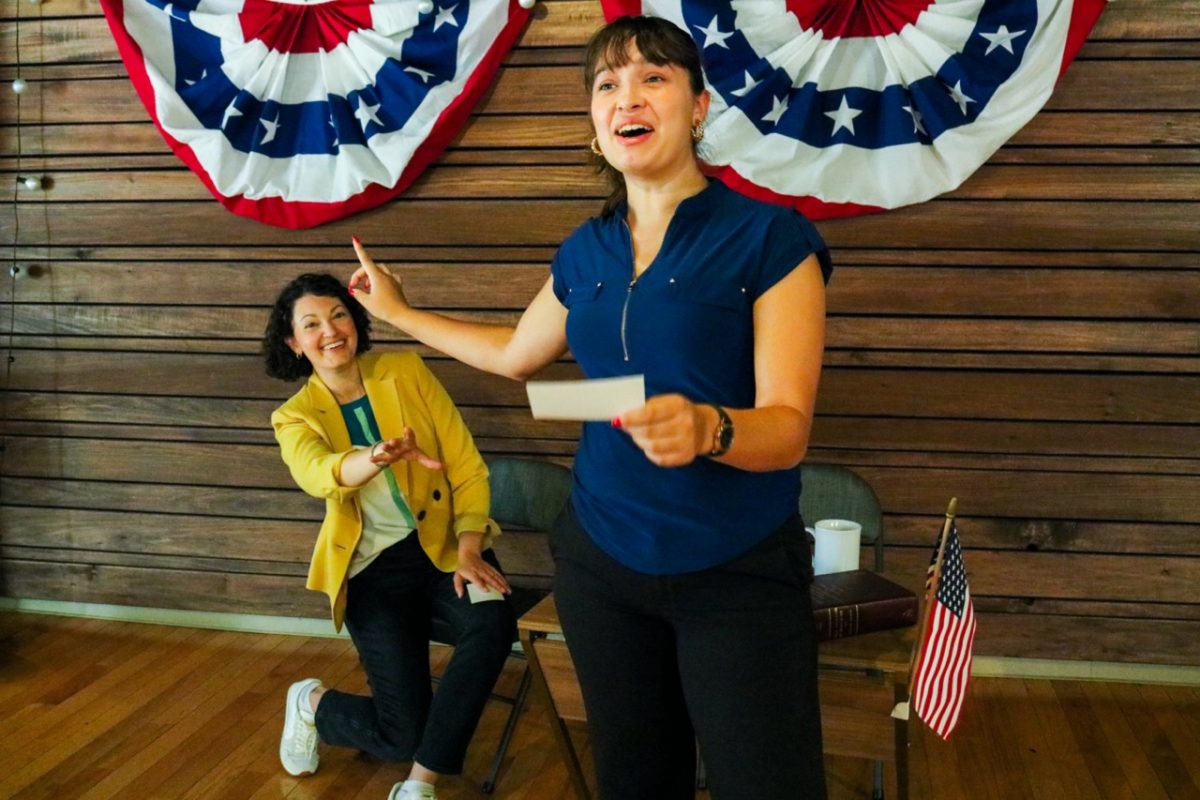We humans are social animals, which is one reason why theater endures as a way for people to share space and feel something together. In a time when our nation feels quite divided (ahem: understatement), any opportunity to learn from history and engage with challenging subjects in thought-provoking ways is a good opportunity. The current Live Arts shows have us covered on that front with back-to-back chances to dig in to the depth of the human experience from two distinct yet resonant perspectives.
As Live Arts’ 2024/2025 Voyages season picks up steam, What the Constitution Means to Me and An Iliad share the Founders Theater and alternate performances. The choice of presenting the plays in repertory makes sense, because they are very much in conversation. Both shows feature powerful performances enhanced by the black box theater’s intimate staging conditions. Audience members feel essential to the storytelling.
In What the Constitution Means to Me, we find ourselves in an American Legion hall represented by a minimalist patriotic set. Enter Heidi, a character based on playwright/original lead Heidi Schreck, who takes us to a scholarship speech contest about the U.S. Constitution that she competed in as a teen. Heidi, portrayed by Tovah Close the night I attended, invites the audience to play the cigar-smoking men who filled the American Legion halls of her youth. We were a predominantly female audience, and the first thing many did when invited to embody men was to take up more space, which resonates with the play’s central theme.
Through Heidi’s personal stories, and those of her grandmothers and mother, we come to understand how preposterous it is for Heidi to be speechifying about the personal relevance of a document that first explicitly mentions women in the 19th amendment, passed in 1919, that granted women the right to vote. As a woman, I found the play to be validating and emotionally challenging. Heidi’s statistics about rape and domestic partner violence against women landed pointedly. Just as the weight of the traumas became overwhelming, there was an intermission. Let me tell you: We hit the bar hard.
Fortunately, the play’s second act offers a respite from heartstring plucking (mostly) by featuring a debate between Heidi and an actual debater (Aafreen Aamir). The topic is whether we should keep or abolish the U.S. Constitution. Honestly, it never occurred to me that we could abolish our Constitution and institute a new one—one that protects the rights of Native Americans, people of color, queer folks, women, and other minorities with the same vehemence as in protecting the rights of white men like our founding fathers. Don’t get me wrong, I’m a proud American, which is probably why the idea of abolishing the Constitution never occurred to me. I’m also a disheartened American, an American who sees that some things need to change as our country continues to evolve, just as the founding fathers envisioned it would.
The following night, I saw An Iliad, which blends sections of Robert Fagles’ translation of Homer’s epic poem with moments of modern contextualization. Two nameless, timeless poets—an elder and a younger—arrive and investigate the sparse set. For several minutes, the audience watches as the elder, portrayed by David Minton (also the director), and the younger by Jesse Timmons, set the stage before beginning the tale. I love that live theater has the power to get me to care about watching a man adjust the placement of a milk crate—and I did care!
The Iliad is a familiar tale to many, with ancient heroes Achilles and Hector leading armies during the Trojan War. The added context breathes life into this show. The Younger Poet likens (spoilers) ill-fated Patroclus’ bloodlust in battle to our modern experience of road rage. He begins by expressing a degree of anger relatable to anyone who’s been cut off in traffic. However, Timmons then takes his performance to an extreme that fills the room with discomfort, graphically describing physical violence, inappropriate as a reaction for a roadway mishap. The Elder Poet touches the younger, to snap him out of his fiery passion, and the younger apologizes, saying something like, “That’s not me. It’s not me.” Reckless uncontrollable rage does not define the man, or at least The Younger Poet doesn’t want it to. One of the play’s most affecting aspects is the tension created by the tenderness between the two characters juxtaposed against the horrors of the Trojan War and all the wars after, including those that are raging even now.
